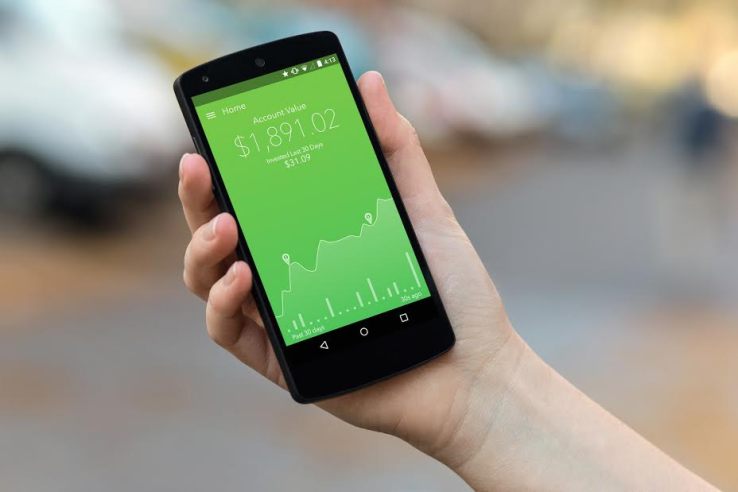Mobile savings and investment service Acorns is on track to do 1 billion trades in 2017

Acorns is quickly turning into an oak tree in the financial services space.
The company now boasts more than 2 million investment accounts (with 600,000 opened in 2017 alone) and is on track to do 1 billion trades in 2017 through the proprietary broker-dealer that it created.
Those are hefty numbers to post for any financial services company, especially considering that Fidelity (one of the nation’s largest money managers) will do approximately 60 million trades over the same period.
However, those numbers also aren’t directly comparable. Acorns relies on micro-transactions, based on its round-up savings and investment system which rounds up amounts of purchases to the nearest dollar and invests the difference in exchange-traded funds that it manages for its customers.
Still, the numbers were impressive enough to attract Bain Capital Ventures to commit another $35 million to the company, bringing Acorns total Series D financing to $70 million. Previous investors PayPal, Greycroft Growth Fund, e.Ventures Growth Fund, NYCA, Capital Group, Rakuten, Point72 and Ashton Kutcher’s Sound Ventures also participated in the round.
With the new money, Acorns is looking at potential acquisitions, according to chief executive Noah Kerner. “The areas of interest to us are the questions about how to make Acorns more personalized,” he said.
One area of particular interest is responsible spending,” Kerner tells me. “It’s a huge area of concern for our customers, and part and parcel of the Acorns experience is connecting spending with responsible saving, so we’re looking at that area. Two of the big-ticket questions… How does a customer spend responsibly and what do they do with the money they have left over.”
The company is also pushing heavily to staff up, adding some heavy-hitters to its staff. Recent additions include Gahl Berkooz as chief data officer.
The former global chief of analytics for General Motors, Berkooz will likely be tasked with organizing, managing and cleaning up data for Jike Chong, another new hire. Chong was the former chief data scientist at Yirendai, China’s massive peer-to-peer lending company, which listed on the New York Stock Exchange.
And while snatching up Berkooz and Chong are impressive, what’s more impressive is the fact that Acorns also managed to snag Chris Jones, the former chief investment officer at BlackRock, a $4.7 trillion money management firm (the world’s largest). That is a big deal. A very big deal.
What Jones brings is more than just a fancy title. Those kinds of numbers are an indication of the outsized ambitions that Acorns has set for itself as it tries to be the financial service of record for the millennial set.
Still, the company faces some stiff competition from direct and indirect competitors, including businesses like Stash Invest (direct), and Wealthfront, Betterment and Robinhood (indirect).
Stash, which just raised $40 million, is Acorns’ closest competitor and has also had a banner year by all accounts. The company said that it’s now servicing more than 850,000 users accounts, adding roughly 500,000 new accounts in 2017.
Meanwhile, Wealthfront and Betterment are also making moves. Both firms have joined the online investor Motif in pushing socially responsible investments.
Not everyone is convinced that Acorns is the best route for people looking to build out an investment portfolio. While some hail it as the “perfect investing app,” other sites have warned consumers to “beware of spare change investments.”
However, the company does charge fees for folks with a minimum balance under $5,000, and in many cases those fees can be higher than their competitors, according to an analysis by PolicyGenius:
Acorns fees are $1 per month for all accounts with a balance under $5,000 and .25%of the balance per year on accounts over $5,000. Compared to traditional management, mutual funds, and DIY ETFs, this fee is incredibly low. Other portfolio advisory services, like Amerivest, charge as much as 1.25% and require a minimum investment of $25,000.
…
Betterment only charges .25%per year for its baseline price tier, amounting to a fee of mere cents per month while you are building up your portfolio.
And what about Wealthfront, another robo-advisor? They require a minimum balance of $500. They do, however, manage the first $10,000 of every account for free.
Funds like Betterment may charge .25 percent for accounts, but don’t offer the same roundup feature that Acorns does.
Where the $1 fee can hurt is when people don’t meet the company’s $5,000 threshold. Over the first months or years of savings, that fee can add up.
Still, as a step on the road to financial stability, folks could do far worse. And Kerner is committed to helping people become better with their finances. That passion shines in every conversation I’ve had with the young chief executive. He’s obsessed with helping people manage their money more responsibly.
“A lot of people know Acorns as a round-up app,” he tells me, but the stat he’s most proud of is that more than 50 percent of customers are using the recurring investment feature. That tool will bring most of Acorns’ customers over that $5,000 threshold… and get them the benefits of a money manager at a significantly lower price.